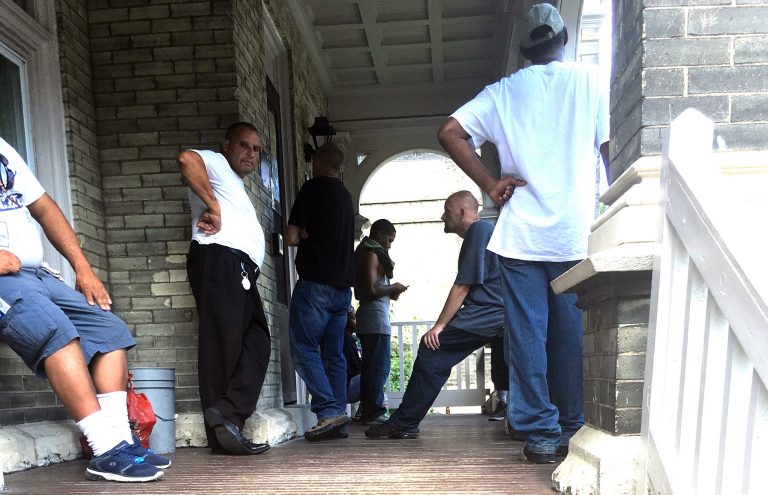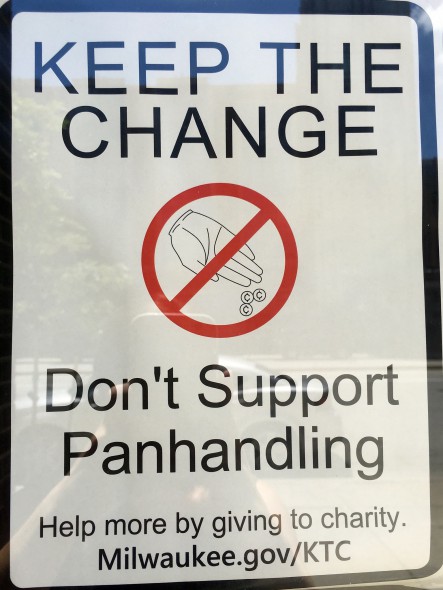City Takes Stance Against Panhandling
Ald. Witkowski's initiative urges people to give to charitable groups, not panhandlers.

Homeless men wait to shower at St. Benedict the Moor Parish, which offers a variety of services such as a free meal program and a shower program. Photo By Rebecca Carballo.
Signs reading “Keep the Change” have been appearing in windows of businesses throughout Milwaukee, advising patrons not to give money to panhandlers. The fliers are a result of the Keep the Change initiative adopted by the Milwaukee Common Council on March 1.
The program encourages donations to nonprofits that serve the homeless and other people in need. “When you Keep the Change, you can help that person make a real change in his or her life,” according to the council’s website.
Tim Schwab, who has been homeless for six months, is not happy about the program. He said he was able to feed himself with the spare change given to him on the streets. “If you have extra change that’s going to fall between your car seats anyways, why not help somebody?” Schwab said. “Fifty cents can go a long way.”
Although the initiative discourages it, panhandling is within the law. Aggressive panhandling, defined as following someone and demanding money, is illegal, but asking for money verbally or silently with a sign or a container — is within an individual’s First Amendment rights.
Schwab said it is a common misconception that homelessness is a result of addiction, and that panhandlers will use the money for drugs.
“(The city) can’t just assume where the money is going to,” Schwab said. “Some people are without a job and trying to get work. I don’t think it’s (the city’s) right to say who someone can give money to. It’s a person’s choice.”
Alderman Terry Witkowski, who sponsored the initiative, encourages residents to donate to charity instead of giving the money to a panhandler.
“Seventy percent of panhandlers are not homeless, according to the Milwaukee Police Department and the District Attorney’s Office,” Witkowski said.
Witkowski also noted there is no guarantee how panhandlers would spend the money. “Your money isn’t going where you think,” he said.
The initiative’s website recommends making contributions to 18 organizations that provide food, shelter or other services to people in need.
Milagro Jones, a South Side resident who was formerly homeless, said he has benefited from some of those organizations, including Cathedral Center, Inc., Guest House of Milwaukee and the Salvation Army.
Jones attended meetings about the initiative and said he was taken aback when he first heard about it.
“It’s my natural inclination to help someone out,” Jones said. “I thought my direct donation would be helpful.”
Although Jones said he sees why business owners do not want panhandlers near their stores, he also remembers a time when he was the one asking for a dollar.
“I understand where the program is coming from and this issue needs to be addressed,” Jones said. “If people don’t like the solution the city came up with, be creative and make a better one.”
Guest House of Milwaukee Executive Director Cindy Krahenbuhl said the initiative’s message can sometimes be misconstrued.
“The message isn’t ‘don’t help people,’ but simply handing them money is not the means to do that.” Krahenbul recommends offering a sandwich or water rather than money.
Carol McLain, director of resource development at Cathedral Center, said organizations such as hers — which provides emergency housing, workforce development and case management services — can better serve the homeless in the long run than giving people spare change.
She added, “We can do more than someone giving five dollars on a street corner.”
Sarah Pollack, partnerships and communications manager at Meta House said some donors have mentioned the initiative and they seemed informed.
Also, business owners and customers said they have noticed a recent decline in panhandling. Vijay Swearingen, owner of Pita Brothers at 1616 W. Wisconsin Ave., attributes that to the Keep the Change sign he displays at his restaurant.
Police Officer Gary Bray, a Pita Brothers customer, agreed that there have been fewer panhandlers on Wisconsin Avenue in the past year.
Bray keeps an eye out for aggressive panhandling, but he noted that it’s important that panhandlers have access to resources they need. “We’re not there to ticket someone,” Bray said. “We try to give them information (about) resources that can help them.”
Alex Deets, a rising junior at Marquette University, said he has been asked for money up to three times during one walk on campus.
“I can tell on their faces that they are not using the money for food,” Deets said. “It’s frustrating because you want to help somebody but that’s not the way to do it.”
He added that panhandlers do not discourage him from patronizing certain businesses. “It’s just a reality you have to deal with,” Deets said.
Deets often eats at Ruby G’s Espresso Bar and Café, at 2043 W. Wells St., which also decided to hang the flier.
Craig Braaten, the café’s owner, said the fliers may be influencing his customers.
“I don’t think fliers will stop panhandling, but maybe it will stop people from giving them money,” Braaten said.
This story was originally published by Milwaukee Neighborhood News Service, where you can find other stories reporting on fifteen city neighborhoods in Milwaukee.























A different approach. When I meet someone on the street asking, I sometimes stop and talk. In a conversation I learn a bit about the person and usually direct them to a location where food is provided. I met a man who talked about his drumming days with a famous jazz musician. We chatted amiably about that, he did not ask for money again as we chatted. We walked into a nearby bar-restaurant. I asked the waitperson to prepare whatever he wanted off the menu and waited with him until the waitperson brought out the food and the bill. I learned from the staff that the man was a regular and they rather appreciated his presence in the neighborhood and they sometimes gave him food. His story of his drumming days rang true; there were facts he could not have invented on the spot and his demeanor was not artificial. Something happened that disconnected him from drumming, whatever it may have been.
This bar was near a church that provides lunch to anyone who shows up. Perhaps that is a clue how neighboring restaurants can collaborate rather than posting signs which discourage what our personal convictions may demand. Your customers are not unanimous about push-back on the needy; emergency resources are not well identified; bus routes to meals are not well publicized. (I used to give bus fare tickets but they are no longer available.)
I understand the point of view of the nearby business, but I hope they understand the point of view of one person in their neighborhood, and I am not alone. One gentleman who made frequent appearances near my office was well dressed in casual clothing, well spoken, a bit of a French (or Western African) accent. Not always, but I gave him change from time to time, and then inquired about his situation. He reported being willing to do “anything” and was dressed appropriately for an on the spot job interview; he presented himself as educated. He has not been around for months now, and I hope he has found his home base.
I would suggest that if more people would simply talk to a panhandler, ask about their well being, maybe hear a story or two – and believe it or not – only those who are faking stories will be reluctant to return. We would all learn, eventually, how to direct the person to a resource that helps reclaim their life.
I am not a social worker but just a citizen making my own way in this economy. I have no right to judge a beggar or a nearby restaurant and have (widely ignored) religious principles to take care, to take time and maybe to share resources. But for five minutes to learn a bit about this person in front of me, that becomes more important to me than what I thought were my primary duties for the day.
This rule totally grosses me out.
I try to give a dollar to anyone who asks, no questions asked.
Seems like the least I can do.
Why tell people to do otherwise?
Because it doesn’t look good? And give to charities? What about our government?
It does seem like this is more about optics than anything else. Not to mention homelessness is a very complicated problem involving addiction, mental health issues, young people being kicked out of homes, women in abusive relationships, etc. KTC seems simplistic.
Tom, it’s about getting them real help and assistance. If they make enough from panhandling then they’ll never go to the shelters, free meals, and other such programs that can actually engage them and get them into programs to help them find permanent solutions. It sounds harsh, but it’s a reality that giving them cash on the street only enables them to continue down the path they’re on. My only hope, and from most people I talk to this is the case, that any proponent of this program follow through and actually donates to organizations that help.
AG have you studied this issue a lot? Where do you get your info? Has anyone looked into the effectiveness and success rate of these local charities that aid the homeless?
Vincent, from what I know (and I don’t claim to be an expert) the success rates of various housing programs, drug rehabilitation programs, and others vary quite a bit… but the one common theme I hear is that the biggest challenge is outreach and getting those who need help to make the first step of coming in and joining programs to begin with.
I’d like to know how effective and successful these charities are. Seems reasonable to ask since we are being asked to donate to them rather than give directly to a homeless person. Hopefully a serious and comprehensive discussion about homelessness and how best to address it stems from this.
That’s a reasonable question, and one with pretty readily available answers. Most decent program will have their annual report available on their website and those reports will tell you how effective they are. At least the larger ones do. Just pick a program and look into them. I think you should always do this before giving a decent sized donation to any non-profit anyway.
Honestly I don’t know much about how these charities measure success. Number of people moved to housing? Number of people they directly helped secure permanent work? Number of people they helped get off drugs or alcohol? Number of people they got mental health treatment for? Number of people they helped enroll in college or a GED program? How do charities that deal directly with helping the homeless measure their success and effectiveness?
It depends on the organization and what their mission is. Unfortunately you can’t sum up all the resources and ask for all the outcomes. Pick one, we can take a look at it.
I know that a lot of people have started offering like a granola bar or apple instead (for example, Marquette University students living in the dorms have an unlimited meal plan iirc, so they can carry around pieces of fruit to hand out if someone is asking for money). Also, you can acknowledge the person instead of ignoring them, like saying, “Sorry, I can’t. Good luck.”
My mom offers a bus ticket (in the past) to people asking for bus money, but most times it would be rejected and you’d know that the person asking wasn’t telling the truth then.
Guest House of Milwaukee’s annual report doesn’t report much. Half of it is a list of staff, donations, and their finances. Most of the rest is a success story and events they’ve done to raise awareness. As for stats/data, there’s the number of permanent housing units they have and their retention rate, and the number of men served in their emergency center and transitional housing. I’m surprised at how little useful information is in the report.
I can see both sides to this story. I believe there are folks out there that just need some change or food or something like that. On the other hand 70% of the people out there are not homeless and that’s the big take away from this article. When you put your change in that 70% hands it is being taken away from the 30% that really need it. It seems like a harsh thing to do but realistically it is for the greater good of that 30%. I’ve lived downtown for almost 10 years and I’ve heard several stories and seen several things. I saw a guy begging for money at the intersection of the McKinley Street from I-43, fold up his cane, straighten out his limp and get into his Cadillac. I’ve seen a junky have a seizure in the middle of Layton ave, had food thrown back at me and been cussed out for not providing money. The people that are truly homeless know where to get help and that is at these shelters and missions. Help these missions and help the people that are really in need.
They’re still new, so no annual report to critique, but Housing First is looking at the problem the other way: http://www.housingfirstmilwaukee.com/